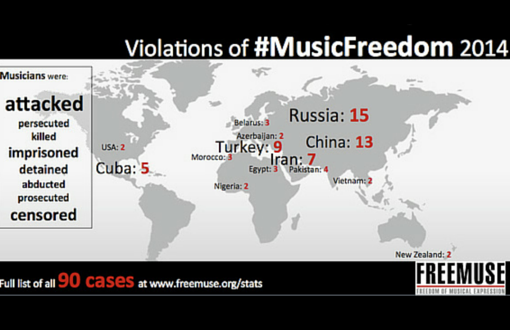Freemuse monitored and documented violations of freedom of expression for musicians on www.freemuse.org in 2014.
Musicians around the world are facing imprisonment, attacks, and censorship in attempts by government and non-state actors to silence the music.
In 2014, Freemuse registered a total number of 90 attacks and violations against musicians’ rights to musical freedom of expression. The cases include: 1 musician killed, 17 musicians imprisoned, 9 musicians attacked and and 14 musicians prosecuted.
Russia tops the unflattering list with 15 cases followed by China with 13 and Turkey with nine cases, according to the Freemuse tally released today. Governmental pre-censorship practices in countries such as Iran, Saudi Arabia and North Korea severely damage music life but cannot be statistically measured.
Daily threats
In Pakistan, Pashto singer Gulnaz was killed when gunmen entered her house and shot her dead. Attacks on female singers are not uncommon in the Khyber Pakhtunkhwa province where music creators and music shops almost daily are facing threats on music life.
In China — one of the great violators of artistic freedom — you don’t get away with music and lyrics addressing the suppression of Tibetan cultural identity. China continues to detain and imprison musicians, who criticise Chinese cultural hegemony. Currently China keeps a dozen Tibetan musicians in detention and imprisonment.
Turkey and Russia — frequently with nationalistic and political overtones — continue to persecute musicians accentuating the troubling erosion of democracy and human rights in the two countries.
National governments' reponsibilities
“Silencing musicians with violence, imprisonment and intimidations not only violates the individual’s right to freedom of expression, it robs local and global communities of the joy and critical perspectives expressed through music,” said Freemuse Executive Director Ole Reitov.
“It is crucial that national governments respect their obligations to implement international human rights conventions.” (EKN/BM)
* Click here to read the article in Turkish.






